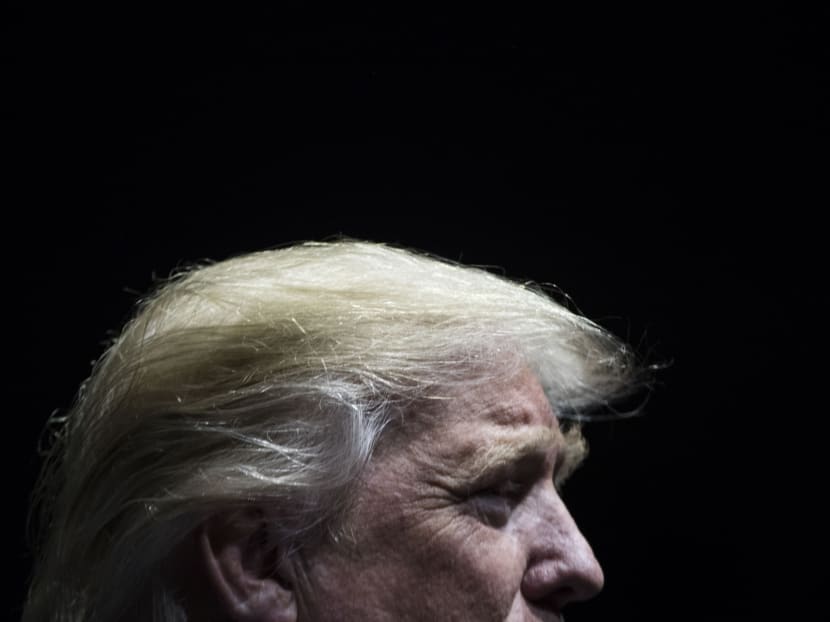Trump’s gambit on One China policy 'unprecedented and risky'
WASHINGTON — While Mr Donald Trump is not the first incoming Republican president to question the One China policy, his suggestion that it could be used as a chip to change Chinese behaviour sets him apart and could have implications for Washington’s relationship with both Beijing and Taipei, experts said.

President-elect Donald Trump holds a rally at the DeltaPlex Arena in Grand Rapids, Mich., Dec 9, 2016. Photo: The New York Times
WASHINGTON — While Mr Donald Trump is not the first incoming Republican president to question the One China policy, his suggestion that it could be used as a chip to change Chinese behaviour sets him apart and could have implications for Washington’s relationship with both Beijing and Taipei, experts said.
Not since 1972, when US President Richard Nixon and Chinese leader Mao Zedong enshrined the One China principle in the Shanghai Communique, has a US president or president-elect so publicly and explicitly questioned the agreement, which resulted in the United States’ ending its diplomatic recognition of Taiwan in 1979.
Indeed, Taiwan itself will be cautious if the incoming Trump government were to use the island as a bargaining chip against the Chinese.
This is because Taipei will be mindful that Beijing might want to punish it rather than take action against Washington, said Dr Ian Storey, a senior fellow with the ISEAS Yusof Ishak Institute.
Over the weekend, Mr Trump said in an interview that he wouldn’t feel “bound by a one-China policy unless we make a deal with China having to do with other things, including trade”.
Mr Trump’s comments on “Fox News Sunday” came after he prompted a diplomatic protest from China over his decision to accept a telephone call from Taiwan President Tsai Ing-wen on Dec 2.
Since recognising the People’s Republic of China in 1979, the US has adhered to the One China policy, recognising Beijing as the capital of China and maintaining only unofficial relations with Taiwan. American law, however, requires the US to ensure that Taiwan has the means to defend itself and to treat all threats to the island as matters of serious concern.
Some Republican foreign policy experts — including John Bolton, who is believed to be a front-runner for the post of deputy secretary of state — have praised Mr Trump for shaking up a four decades-old diplomatic agreement.
As a candidate, Ronald Reagan criticised the decision to abrogate recognition of Taiwan; after his election, he invited a delegation from Taiwan to attend his inauguration, antagonising Beijing.
In 1982, as president, Reagan pushed for the Six Assurances, one of which was a reaffirmation that the US did not formally recognize Chinese sovereignty over Taiwan. Still, he abided by the terms of the 1979 joint communiqué that established relations between the United States and China.
“There are good reasons why eight presidents since 1972 have relied on the One China policy,” said Mr Evan Medeiros, a former senior director for Asia at the National Security Council.
“By putting One China up for grabs, Trump will suck all the oxygen out of the US-China relationship, and it risks eventually trading away US support for Taiwan for another US interest,” he added.
“This is one area where the Trump team would do well to heed the lessons of history instead of bucking them in the uncertain hope of getting something,”
Mr Jeffrey A Bader, Mr Medeiros’ predecessor in the Barack Obama administration, said the One China policy had “always been seen as a foundation of the relationship”.
“Now Trump apparently sees it as part of a broader set of new transactions,” he said.
“Mixing trade with an issue seen by Beijing as involving sovereignty is likely to produce an angry Chinese backlash and worsen both issues.”
Experts say however it is too early to conclude that Mr Trump will go as far as to upend the One China agreement.
“It’s very doubtful that the Trump administration will jettison the One China policy, as it needs Beijing’s cooperation on a range of international issues,” said Dr Storey.
“But perhaps it will seek to give Taiwan a bit more international space, and step up defence sales to the island.
The Chinese government, which once viewed Mr Trump favourably as an alternative to the hawkish Hillary Clinton, has struggled to respond to Mr Trump’s unorthodox approach.
But as Mr Trump has repeated his campaign criticisms of China — and as his statements about Taiwan have rippled throughout the region — Beijing has noticeably hardened its tone.
Mr Trump’s suggestion that he could negotiate on Taiwan likely went too far for China, said Dali Yang, a political science professor at the University of Chicago.
“He expected for China to bargain again for the one-China position, perhaps by giving up something on trade or something of that nature,” Prof Yang said. “This is actually the foundation of the U.S.-China relationship, rather than something to be bargained over.”
Ms Angela Poh, a China researcher from the S Rajaratnam School of International Studies (RSIS), said Beijing will not tolerate any deviation by Washington from its One China policy once Mr Trump takes office in January.
“China will not hesitate to use military signalling to respond if necessary,” she added. AGENCIES with additional reporting by Ben Ho






